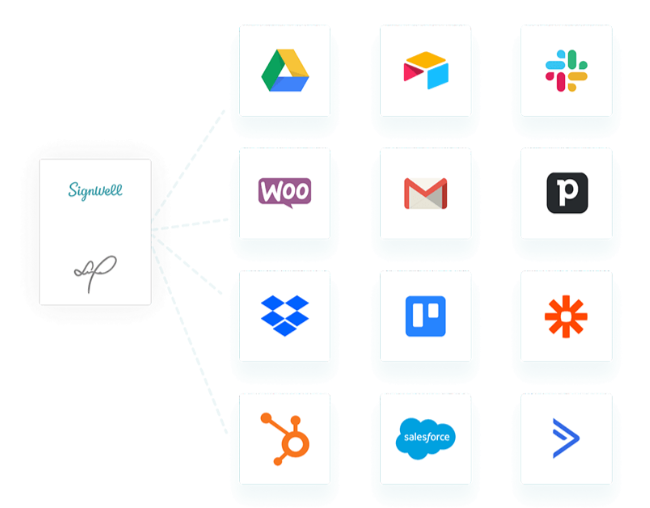Helpful Summary
- Overview: We outline the best practices for ensuring your electronic signatures are legally binding and secure.
- Why you can trust us: At SignWell, we’ve enhanced the document signing processes of many businesses with our secure eSignature solutions. Clients often report faster signing times and improved security, demonstrating the effectiveness of our platform.
- Why this is important: Sticking to best practices for eSignatures ensures compliance with legal standards, which is crucial for maintaining trust in digital transactions.
- Action points: Choose a reliable eSignature platform like SignWell, implement robust verification methods, and establish a clear electronic signature policy.
- Further research: Check out the SignWell blog for more insights on optimizing eSignature processes and ensuring secure digital transactions.
Curious About Using eSignatures For Your Transactions?
Are you considering using eSignatures for your transactions? This is a great way to streamline processes and reduce paperwork. However, it’s essential to understand the best practices for ensuring the legality and security of your eSignatures.
In this SignWell article, we’ll provide you with best practices on how to use eSignatures effectively and confidently, protecting your transactions and maintaining compliance with legal requirements.
But first…
Why Listen to Us?
At SignWell, we’ve helped numerous organizations optimize their document signing processes with our secure and user-friendly eSignature solutions. Our clients consistently report significant improvements, including faster turnaround times and enhanced security.
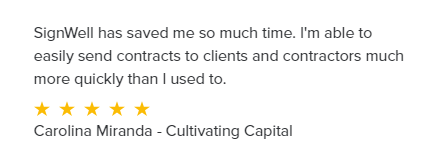
Committed to legal compliance, SignWell ensures your business can operate efficiently while maintaining trust in every digital transaction.
What is an eSignature?
An electronic signature (eSignature) is a digital method of indicating a person’s approval or agreement with the contents of a document. It can range from typing a name or inserting a digital image of a handwritten signature to using biometric authentication. eSignatures are legally binding in many jurisdictions and serve as a more efficient and secure alternative to handwritten signatures, especially for transactions.
Benefits of using eSignatures for transactions include:
- Faster Completion: eSignatures allow up to 82% of agreements to be completed in less than a day, speeding up transactions.
- Cost Savings: They reduce materials, storage, and administration expenses by up to 78%.
- Enhanced Security: With encryption, audit trails, and tamper-evident seals, eSignatures offer superior protection over traditional methods.
- Compliance: eSignatures meet legal standards across multiple jurisdictions, ensuring secure and legally valid transactions.
- Global Accessibility: eSignatures support 24/7 availability and mobile access, making global transactions seamless.
6 eSignature Best Practices for Secure and Legal Transactions
1. Choose a Reliable eSignature Platform
Selecting an eSignature platform that adheres to legal standards is essential to ensure your transactions are secure and legally binding.
Choose an eSignature platform that complies with relevant laws, such as the UETA and ESIGN Act in the United States, eIDAS regulation in Europe, and PIPEDA in Canada. These laws protect the integrity of electronic signatures and safeguard the rights of all parties involved.
At SignWell, we prioritize compliance with US and international laws, ensuring your electronic signatures meet the highest legal standards. Our platform is built to secure your documents throughout the entire signing process, with advanced encryption both in transit and at rest to prevent unauthorized access or tampering.
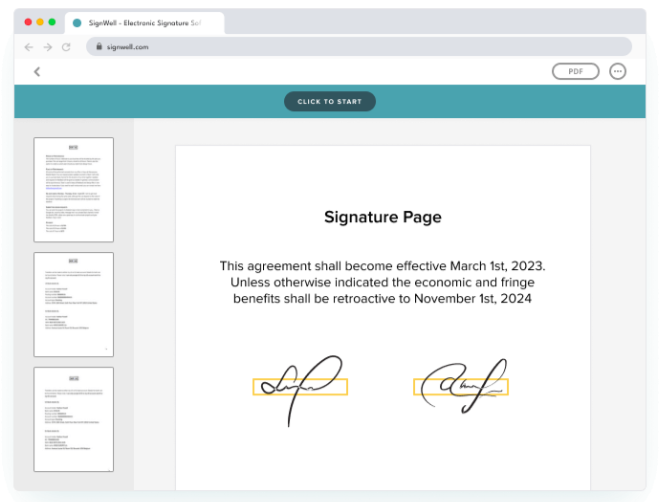
Other Benefits of Using SignWell eSignature for transactions include:
- User-friendly interface: Our platform’s easy-to-use interface is perfect for everyone. With an intuitive design and clear prompts, users can create, send, and manage documents with just a few clicks.
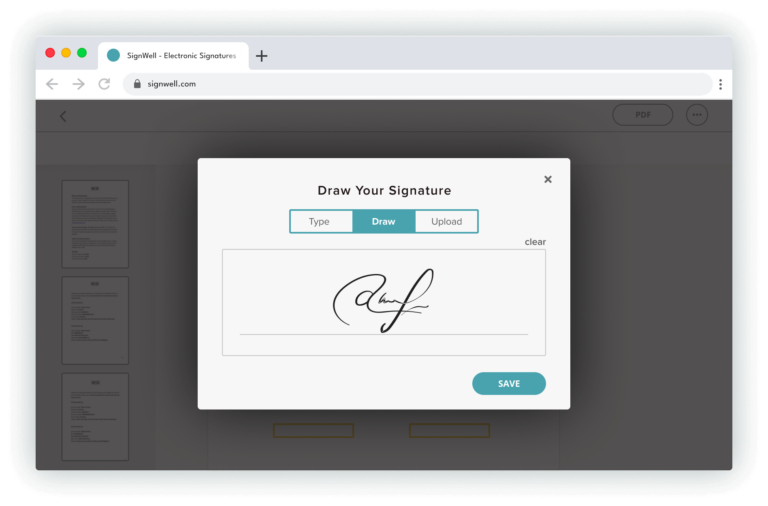
- Optimized workflows: SignWell lets you send, track, and manage documents in real-time, ensuring that signatures are obtained without unnecessary delays.
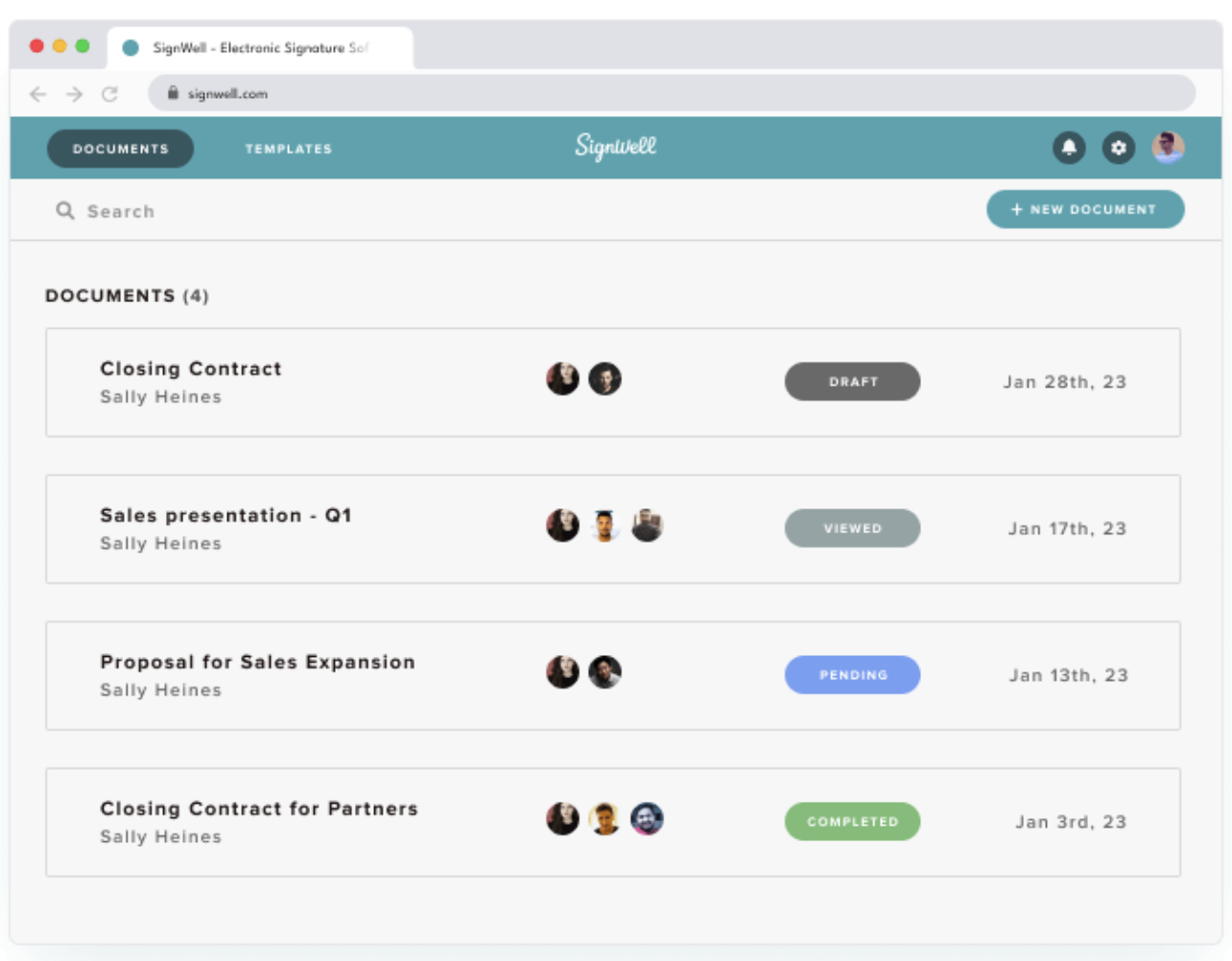
- Flexible pricing: We offer a flexible pricing structure that allows you to choose from various plans tailored to your needs, making it easy to scale your eSignature usage as your business grows without being tied to long-term contracts.
- Branded experience: Customizable signing experiences enhance user interaction with your brand.
- Seamless integration: SignWell smoothly integrates with your website or application. With our robust API and user-friendly plugins, you can customize the signing experience to fit seamlessly within your existing workflows.
2. Verify Signer Authenticity
To maintain the integrity of your agreements, it’s crucial to verify each signer’s authenticity, as electronic signing can be vulnerable to fraud, identity theft, or unauthorized access. Here are effective methods to ensure the legitimacy of each signer:
- Multi-Factor Authentication (MFA): Require signers to verify their identity through multiple forms of authentication, such as a password combined with a one-time code sent via SMS or email. This additional step enhances security, making it significantly harder for unauthorized individuals to access and sign documents, even if they have the password.
- Use biometric verification: Biometric authentication methods like fingerprint scanning or facial recognition add an advanced level of security to your eSignature workflow. Biometrics are unique to each individual, making it virtually impossible for unauthorized users to forge a signature or impersonate a signer.
- Verify with email and IP address: Cross-check the signer’s email and IP address against their credentials to identify discrepancies. If any unusual activity is detected, take extra verification steps to confirm the signer’s identity.
3. Maintain Detailed Audit Trails
Keep records of all interactions with the document, including who accessed it and when. This transparency ensures accountability and supports compliance with legal requirements.
SignWell provides you with comprehensive audit reports that offer full visibility into document activity from start to finish. With this, you can easily track when a document was sent, viewed, signed, or even declined.
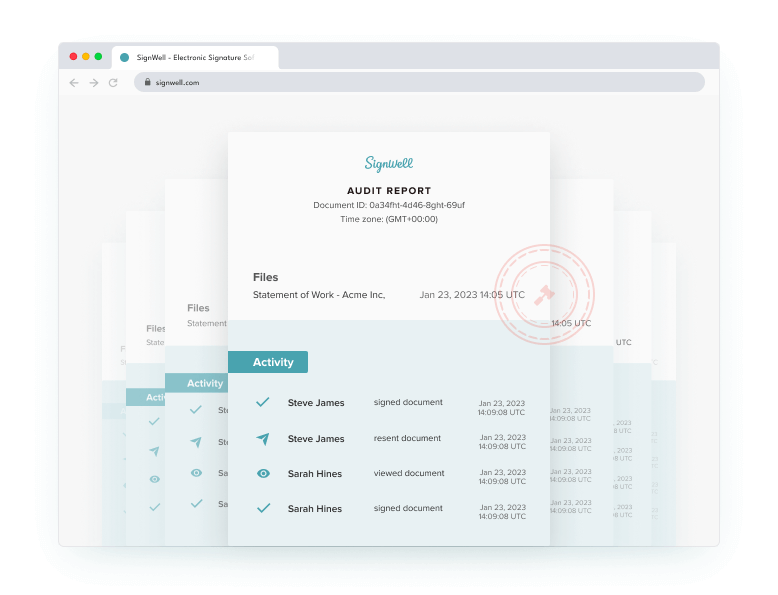
Your audit trail should include the following essential elements:
- Time Stamps: Record the exact times when the document was opened, signed, or forwarded.
- Signer Information: Capture the signer’s name and email address for identification.
- IP Address: Log the signer’s IP address to help verify their location during the signing process.
- Change Documentation: Maintain a comprehensive record of any changes made to the document, ensuring transparency throughout the process.
4. Have an Electronic Signature Policy
An electronic signature policy is a formal document that outlines the procedures, standards, and security measures for using eSignatures within your organization. This policy ensures that your eSignatures are secure, legally binding, and consistently applied across all departments.
Here are some tips for developing a comprehensive electronic signature policy:
- Define Clear Objectives: Clearly articulate the goals of your eSignature policy to establish a solid foundation for its development.
- Determine the Scope: Identify which documents and transactions require electronic signatures and specify any exceptions.
- Specify Legal Compliance Requirements: List the relevant laws and regulations that your organization must adhere to, ensuring full compliance in your eSigning processes.
- Clarify Signing Authority: Define which individuals or roles within the organization are authorized to sign specific types of documents, establishing accountability and preventing unauthorized signatures.
5. Use eSignatures for the Right Documents
While eSignatures are legally valid for a wide range of business agreements, it’s essential to recognize that certain transactions may still require a traditional handwritten signature. Examples include wills, property transfers, and specific legal documents, which may be subject to jurisdictional regulations.
To ensure compliance and mitigate risks, take the following steps:
- Identify Eligible Documents: Familiarize yourself with the types of documents that can be signed electronically within your industry, such as contracts, NDAs, and service agreements.
- Consult Legal Counsel: Engage with a legal expert to clarify which documents are appropriate for eSigning and understand any exceptions that may apply to your jurisdiction or specific circumstances.
- Stay Informed on Regulations: Stay up-to-date with eSignature laws and regulations to ensure ongoing compliance and avoid potential pitfalls.
6. Regularly Train Your Team on eSignature Best Practices
Ensuring that all employees understand how to properly use eSignatures is crucial to maintaining security and compliance. Regular training sessions can help your team stay informed about the latest eSignature trends, legal requirements, and best practices.
Consider the following strategies:
- Conduct Training Workshops: Organize workshops or seminars to educate your team about the functionalities of your chosen eSignature platform and the importance of security measures.
- Provide Updated Resources: Offer access to updated materials, such as guidelines or handbooks, that outline best practices for using eSignatures securely and legally.
- Encourage Open Communication: Foster an environment where team members can ask questions or express concerns regarding eSignature processes, ensuring everyone is on the same page.
- Implement Feedback Mechanisms: Regularly gather feedback from your team about their experiences with eSignatures and any challenges they face, allowing for continuous improvement of your processes.
Create Legal and Secure eSignatures with SignWell
Choosing a reliable eSignature platform is crucial for ensuring the security, legality, and efficiency of your electronic signature processes.
SignWell meets all these requirements, ensuring compliance with relevant eSignature laws and implementing robust security measures, including end-to-end encryption and detailed audit trails. It also integrates seamlessly with many popular business tools, enhancing existing workflows without disruption.
Sign with a team that knows what you need.
Putting a signature on a document shouldn’t be hard. The SignWell mission? Simplify how documents get signed for millions of people and businesses.
Get Started Todaybusinesses served, so far...
total documents signed
customer support satisfaction
